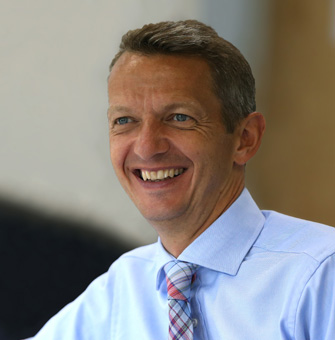
Andrew G. Haldane, FAcSS is the chief economist and the Executive Director of Monetary Analysis and Statistics at the Bank of England. In 2014 he was named by Time Magazine as amongst the world's 100 most influential people.
How would you characterise your current work?
Around a third of my time is spent understanding the economy and setting interest rates, as part of the Monetary Policy Committee (MPC). A third is spent overseeing the Bank’s Research efforts. And the final third involves outreach and education initiatives, my role as Chair of the Government’s Industrial Strategy Council and various other extra-curricular and charitable activities.
How do you feel about maths?
I am very far from being a natural mathematician! In fact, at school I avoided it like the plague. But having self-taught myself some maths before I started post-graduate study, I have progressively become more interested and experienced in what it has to offer, in particular when clarifying problems and having the tools to solve them.
What is it about your work that is mathematical?
Quite a bit of my work involves data, often lots of data. So basic numeracy and logic skills are important for making sense of those numbers. Another chunk of my role involves (both consuming and producing) research, which often draws on complex mathematical models of various types. We also have a selection of mathematical models both empirical and theoretical, for helping understand and forecast the economy.
How do you use maths, calculation or numeracy in your work? What tools do you use to help you?
Maths and numeracy are crucial to making sense of the economy, whether it is simply adding up the components of GDP or developing highly-complex mathematical models of the economy. The tools for doing so range from pen and paper, through spreadsheets to sophisticated computer models.
Do you think maths is creative? If so, how?
I think all disciplines are creative, in the right hands, and maths is no exception. I think knowledge of mathematics is crucial for helping define problems in precise and rigorous terms, clearing away the clutter. Articulating the essence of an argument is an extremely creative process and maths can be a key to unlocking that simplicity. Number theorist Paul Erdos would say this was seeking a solution “from the book” (as written by God).
Do you use or rely on any maths that you learnt in school?
Yes, the everyday basics of maths and algebra I use every working day. Some of the more complex stuff, like differentiation and integration, I would also use regularly as part of my research.
How would you change the school curriculum, if you had the chance? Why?
Numeracy and maths are not the same thing. The core of the curriculum needs to focus more squarely on the first, including by grounding it in everyday decisions. Too many people are leaving school innumerate. It is inexcusable not to have prepared young people for making effective everyday decisions involving numbers, which might lead them to make better choices around saving and spending and borrowing.
Join the conversation: You can tweet us @CambridgeMaths or comment below.